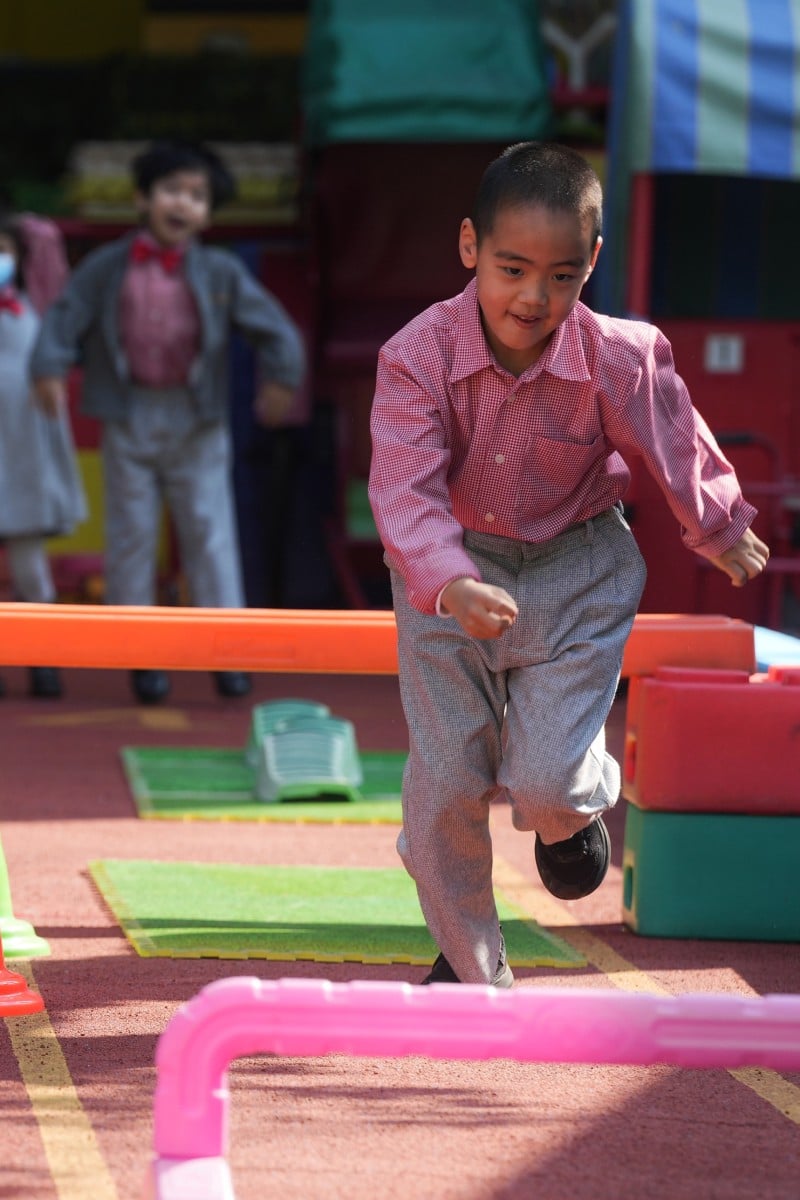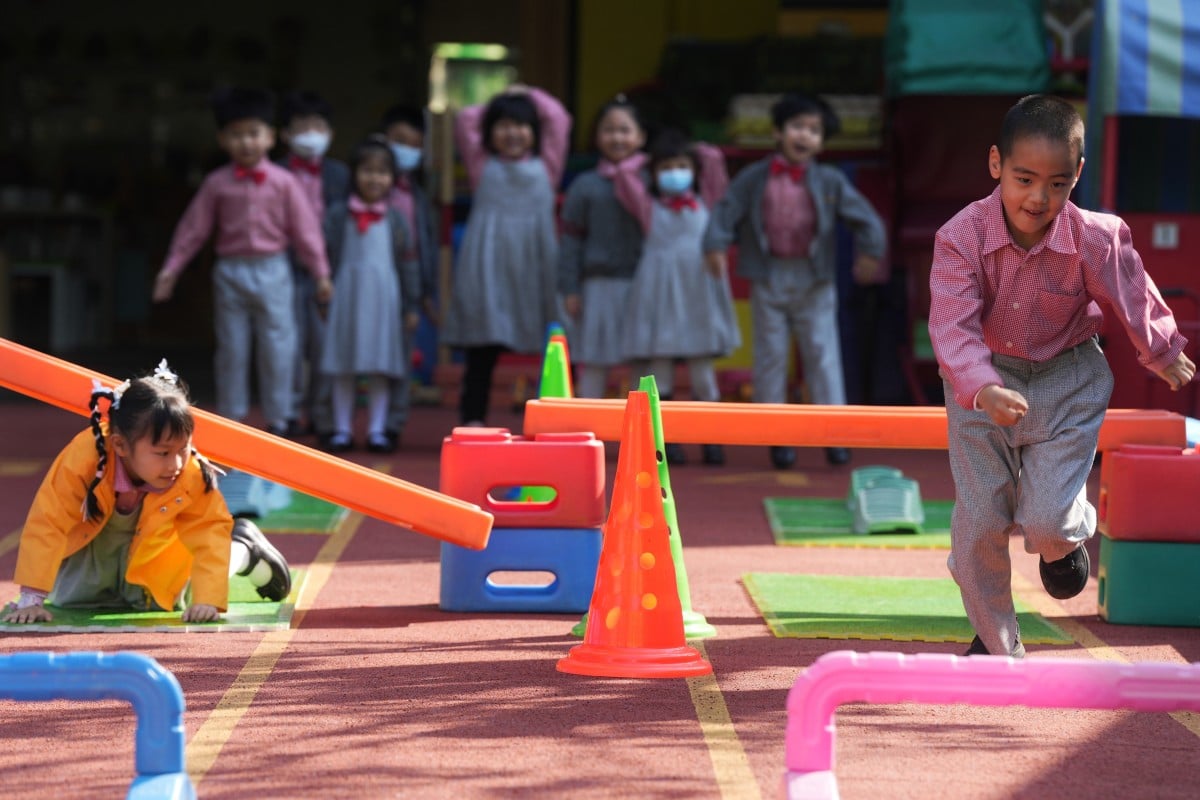
Face Off: Should people still wear masks even though it is no longer mandated in Hong Kong?
- Each week, two of our readers debate a hot topic in a showdown that doesn’t necessarily reflect their personal viewpoints
- This week, they discuss whether Hongkongers should keep covering their faces, even if it is no longer required by law
 Kids play outside at Creative Kindergarten in Kowloon Tong after the end of the mask mandate. Photo: Elson Li
Kids play outside at Creative Kindergarten in Kowloon Tong after the end of the mask mandate. Photo: Elson LiIf you are interested in joining future Face Off debates, fill out this form to submit your application.
For: Taylor Ho, 12, Hong Kong International School
Although mask mandates have been lifted worldwide, people should still be encouraged to wear masks in some circumstances. Masks help protect people against respiratory illness; after all, Covid-19 still exists, and every year we have a new strain of the flu.
People who are elderly, immunocompromised, or unvaccinated would benefit from wearing masks in public places to protect themselves, and those who are sick should wear masks to protect others.
Mask-wearing is an effective public health measure, and not just for Covid-19. Many doctors recommended people wear them when a “tripledemic” of the coronavirus, influenza and respiratory syncytial virus swept through the United States late last year.
This is because evidence shows that masks reduce the transmission of several respiratory viruses. For example, one paper published in 2020 by researchers in
Hong Kong showed that people with either Covid-19 or the flu breathed out fewer viral particles while wearing a mask.
Meanwhile, a study of Covid-19 policies in schools in the US city of Boston found that removing a mask mandate in 2022 caused 12,000 additional cases of flu among students and teachers.
In the US, influenza and other respiratory viruses decreased during the 2020 and 2021 winter seasons due to the protections taken to prevent the spread of Covid-19. “What Covid has shown us, because we’ve been social distancing and mask-wearing, is that influenza and common cold viruses are suppressed remarkably by these small behaviours,” said Dr William Schaffner, a professor of preventive medicine at the Vanderbilt University School of Medicine in the US.
While masks are most effective at stopping the spread of viruses when the infected person is wearing one, masking to protect yourself from disease – whether it’s the coronavirus, flu or even the common cold – is still beneficial, which is why people should continue wearing masks.
Hong Kong axed its mask mandate, but don’t judge those who keep them on
Against: Valerie Shek, 12, Independent Schools Foundation (Secondary)
Masks were highly beneficial during the pandemic, and no doubt reduced the spread of coronavirus, but their post-pandemic future is less certain. One major drawback of masks is that they make communication more difficult. For example, a recent report by the UK Education Department suggested that mask-wearing during the pandemic caused classroom communication difficulties.
Recent data revealed that the number of children in Hong Kong under 12 with speech-related problems rose significantly during the pandemic, from 4,300 cases in 2019 to 4,570 in 2020 and 5,401 in 2021. Some experts attribute this trend to the fact that children could not observe their teachers’ mouth movements to imitate them and could not hear them clearly either, as the teachers were masked.
Masks have also had a negative impact on students’ social skills. Facial expressions are integral to human connection, particularly for young children learning to signal fear, confusion and happiness. Covering a child’s face mutes these non-verbal forms of communication and can result in robotic and emotionless interactions.
Seeing people speak is a building block of phonetic development, and it is crucial for children with disabilities, such as hearing impairments. Experts are concerned that three years of mask-wearing has hampered children’s ability to socialise and express themselves – far-reaching impacts that may take years to address.
Hong Kong children bear the cost of missing school, as more are diagnosed with learning problems
Some may be fine with wearing a mask, but others struggle, and people who wear glasses could have difficulty seeing because their mask fogs up their lenses. Masks can cause severe acne and other skin problems, too, and they can exacerbate breathing difficulties, distracting children from learning and adults from working.
Government pandemic adviser Professor Ivan Hung Fan-ngai from the University of Hong Kong has even said that students “really need to take their masks off” because it would benefit their language learning and increase their natural immunity.
After three years, let us embrace removing our masks and usher in an era of normalcy where people can smile and talk without being muffled.
